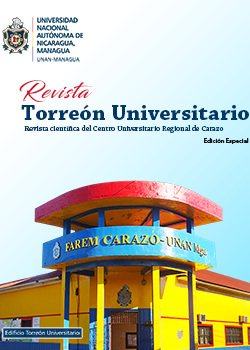Percepción curricular del nuevo Modelo de Educación Inicial para el Desarrollo Infantil (MEIDI) por parte de asesores y maestras en la ciudad de Jinotepe, Carazo, durante el I semestre del año 2022
DOI:
https://doi.org/10.5377/rtu.v1i1.19051Keywords:
MEIDI, currículo, educación inicial, desarrollo infantilAbstract
Este estudio evaluó la pertinencia curricular del Modelo de Educación Inicial para el Desarrollo Infantil (MEIDI) implementado en Jinotepe, Carazo, durante el primer semestre de 2022. Utilizando un enfoque cualitativo y fenomenológico, se realizaron observaciones y entrevistas a maestras, educadoras comunitarias y asesoras pedagógicas. Los resultados revelaron que, aunque el MEIDI ha mejorado la estructura de la planificación diaria y el programa educativo, existen desafíos significativos en su implementación. Entre estos desafíos se destacan la rigidez del programa y la insuficiente capacitación de las educadoras, lo que afecta su capacidad para adaptar el currículo a las necesidades locales y a las realidades del entorno educativo. Las conclusiones sugieren la necesidad de aumentar los esfuerzos en formación continua y de ajustar el currículo para mejorar su flexibilidad y pertinencia.
Downloads
References
García, J. B. (2018). Formación continua y calidad educativa en la educación inicial. Revista de Educación Inicial y Preescolar, 12(1), 45-58.
Ministerio de Educación de Nicaragua (MINED). (2022). Guías y Manuales del Modelo de Educación Inicial para el Desarrollo Infantil (MEIDI). Managua: MINED.
Peralta, M. V. (2009). La importancia de la pertinencia curricular en la educación inicial. Revista Iberoamericana de Educación, 49(3), 25-39.
Smith, J. (2017). Educational resources and their impact on learning outcomes. Journal of Early Childhood Education, 35(2), 101-115.
Vygotsky, L. S. (1978). Mind in Society: The Development of Higher Psychological Processes. Cambridge, MA: Harvard University Press.
World Bank. (2021). Education in Nicaragua: Challenges and Opportunities. Washington, DC: World Bank Publications.
Downloads
Published
Issue
Section
License
Copyright (c) 2024 National Autonomous University of Nicaragua, Managua

This work is licensed under a Creative Commons Attribution-NonCommercial-NoDerivatives 4.0 International License.
The authors who publish in this journal agree to the following terms.
- The author or authors of the articles, essays or research grant the National Autonomous University of Nicaragua, Managua (UNAN-Managua) the editing rights (copyright) of the submitted work, therefore the University has the exclusive right to publish the article for the entire copyright period.
- These copyrights/authors authorize Torreón Universitario Magazine and the University to edit and disseminate/publish the article in said Magazine, including printed and electronic reproduction, storage, retrieval and any other type of publication, and sources of secondary information as services. of summaries and databases, they also empower it to protect the article against unauthorized use for dissemination by printed or electronic media (PDF, HTML, EPUB, XML or others).
License for use of content
The magazine uses the Creative Commons Attribution-NonCommercial-NoDerivs 4.0 International License.
Under this statement:

This journal is licensed under a Creative Commons Attribution-NonCommercial-NoDerivatives 4.0 International License. It can be copied, distributed and transmitted publicly as long as the author and source are cited (Revista Torreón Universitario), it should not be modified or used for any commercial purpose. The full license can be found at http://creativecommons.org/licenses/by-nc-nd/4.0/.



